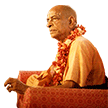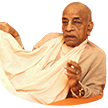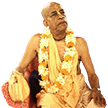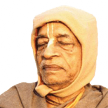Hanuman - a glorious personality: Difference between revisions
(Created page with "Category:Glorious Personalities Category:Glorious Personalities from Bhagavad Gita Category:Glorious Personalities from Srimad Bhagavatam Category:Glorious Perso...") |
No edit summary |
||
| Line 11: | Line 11: | ||
{{Personalitiesnav}} | {{Personalitiesnav}} | ||
<!----------------- BEGIN STANDARD HEADING -----------------> | <!----------------- BEGIN STANDARD HEADING -----------------> | ||
Srila Prabhupada's books, lectures, conversations and letters reveal the qualities of this glorious personality as seen in the Vaniquotes '''[[Vaniquotes:Category: | Srila Prabhupada's books, lectures, conversations and letters reveal the qualities of this glorious personality as seen in the Vaniquotes '''[[Vaniquotes:Category:Hanuman|Hanuman]]''' category. An introduction from his books is given below in the following 8 quotes. | ||
<!----------------- END STANDARD HEADING -----------------> | <!----------------- END STANDARD HEADING -----------------> | ||
---- | ---- | ||
== Quotes from Srila Prabhupada's | == Quotes from Srila Prabhupada's books == | ||
<!----------------- edit quote boxes below this line -----------------> | <!----------------- edit quote boxes below this line -----------------> | ||
{{VaniQuotebox| | {{VaniQuotebox|A host of Gandharvas is always engaged in chanting the glories of Lord Ramacandra. That chanting is always extremely auspicious. Hanumanji and Arstisena, the chief person in Kimpurusa-varsa, constantly hear those glories with complete attention|A host of Gandharvas is always engaged in chanting the glories of Lord Rāmacandra. That chanting is always extremely auspicious. Hanumānjī and Arṣṭiṣeṇa, the chief person in Kimpuruṣa-varṣa, constantly hear those glories with complete attention. '''(Śrīmad-Bhāgavatam 5.19.2)'''}} | ||
{{VaniQuotebox| | {{VaniQuotebox|Anger can also be used in the service of Krsna when it is applied to the nondevotee demons. Hanumanji applied his anger in this way|Being impelled by lust, an ordinary worker will work hard day and night; similarly a devotee can work hard day and night to satisfy Kṛṣṇa. Just as karmīs are working hard to satisfy kāma-krodha, a devotee should work in the same way to satisfy Kṛṣṇa. Similarly, krodha (anger) can also be used in the service of Kṛṣṇa when it is applied to the nondevotee demons. Hanumānjī applied his anger in this way. '''(Śrīmad-Bhāgavatam 4.25.24)'''}} | ||
{{VaniQuotebox| | {{VaniQuotebox|Even the animals may be included in devotional service to the Lord, and the best example is set by Sri Vajrangaji, or Hanuman, the great devotee of Lord Sri Rama|The common religion of all classes of human beings, regardless of whosoever and whatsoever one may be, is devotional service. Even the animals may be included in devotional service to the Lord, and the best example is set by Śrī Vajrāṅgajī, or Hanumān, the great devotee of Lord Śrī Rāma. As we have already discussed, even the aborigines and cannibals can also be engaged in the devotional service of the Lord if they happen to be under the guidance of a genuine devotee of the Lord. '''(Śrīmad-Bhāgavatam 2.8.18)'''}} | ||
{{VaniQuotebox| | {{VaniQuotebox|Hanuman became successful by rendering personal service to Lord Ramacandra. Arjuna became successful by being a friend of Krsna. And Bali Maharaja became successful simply by offering all of his possessions to Krsna|King Pṛthu became successful by worshiping in the temple. Akrūra became successful by offering prayers. Hanumān became successful by rendering personal service to Lord Rāmacandra. Arjuna became successful by being a friend of Kṛṣṇa. And Bali Mahārāja became successful simply by offering all of his possessions to Kṛṣṇa. '''(Nectar of Devotion, Chapter 14)'''}} | ||
{{VaniQuotebox| | {{VaniQuotebox|Hanuman, the great devotee of Rama, said, "I know that there is no difference between the Sita-Rama and Laksmi-Narayana forms of the Supreme Personality of Godhead, but nevertheless, the form of Rama and Sita has absorbed my affection and love|Hanumān, the great devotee of Rāma, said, "I know that there is no difference between the Sītā-Rāma and Lakṣmī-Nārāyaṇa forms of the Supreme Personality of Godhead, but nevertheless, the form of Rāma and Sītā has absorbed my affection and love. Therefore I want to see the Lord in the forms of Rāma and Sītā." Similarly, the Gauḍīya Vaiṣṇava loves the forms of Rādhā and Kṛṣṇa, and Kṛṣṇa and Rukmiṇī at Dvārakā. '''(Śrīmad-Bhāgavatam 3.20.25)'''}} | ||
{{VaniQuotebox| | {{VaniQuotebox|Hanuman, the great servitor of Lord Rama, exhibited his wrath by burning the golden city of Ravana, but by doing so he became the greatest devotee of the Lord|Hanumān, the great servitor of Lord Rāma, exhibited his wrath by burning the golden city of Rāvaṇa, but by doing so he became the greatest devotee of the Lord. Here also, in Bhagavad-gītā, the Lord induces Arjuna to engage his wrath upon his enemies for the satisfaction of the Lord. Therefore, lust and wrath, when they are employed in Kṛṣṇa consciousness, become our friends instead of our enemies. '''(Bhagavad-gītā 3.37)'''}} | ||
{{VaniQuotebox| | {{VaniQuotebox|He (Pariksit) marked his flag with the mark of a lion, and his grandfather (Arjuna) marked his with the mark of Hanumanji|Maharaja Pariksit is distinguished from his grandfather Arjuna, for black horses pulled his chariot instead of white horses. He marked his flag with the mark of a lion, and his grandfather marked his with the mark of Hanumanji. '''(Śrīmad-Bhāgavatam 1.16.11)'''}} | ||
{{VaniQuotebox| | {{VaniQuotebox|Lord Krsna is Rama Himself, and wherever Lord Rama is, His eternal servitor Hanuman and His eternal consort Sita, the goddess of fortune, are present. Therefore, Arjuna had no cause to fear any enemies whatsoever|Lord Kṛṣṇa is Rāma Himself, and wherever Lord Rāma is, His eternal servitor Hanumān and His eternal consort Sītā, the goddess of fortune, are present. Therefore, Arjuna had no cause to fear any enemies whatsoever. And above all, the Lord of the senses, Lord Kṛṣṇa, was personally present to give him direction. '''(Bhagavad-gītā 1.20)'''}} | ||
<!----------------- edit quote boxes above this line -----------------> | <!----------------- edit quote boxes above this line -----------------> | ||
''' | '''Hanuman - [[Vaniquotes:Category:Hanuman|explore more within this category]]'''. | ||
{{GloriousPersonalitiesTotal}} | {{GloriousPersonalitiesTotal}} | ||
Latest revision as of 13:26, 12 February 2017
INTRODUCTION TEXT TO BE WRITTEN
Srila Prabhupada's books, lectures, conversations and letters reveal the qualities of this glorious personality as seen in the Vaniquotes Hanuman category. An introduction from his books is given below in the following 8 quotes.
Quotes from Srila Prabhupada's books
Hanuman - explore more within this category.
Vanipedia has now over 215 introductory articles compiled from Srila Prabhupada's teachings under the series titled Glorious Personalities. All these articles can be seen in the Table of Content on the right side of this article and also here in this Umbrella Category. Browse through them to relish the breadth and depth of Srila Prabhupada's teachings - There is an attractive personality for everyone.






